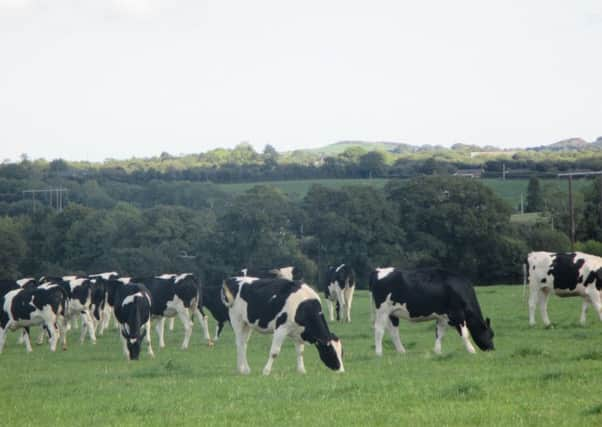Protect your herd against Salmonella


Gareth Bell, of Jubilee Veterinary Clinic in Newtownards, said: “A clinical outbreak of Salmonella on a farm can be quite traumatic with cows suffering acute diarrhoea, condition loss and abortion, and all the losses that come with that.
“At the time of an outbreak, farmers will be advised to vaccinate the entire herd immediately. The danger is that once several years have passed without any obvious clinical signs, they can be tempted to stop vaccinating and hope for the best. This is something I have seen several farmers do over the years, and it has come back to haunt them with Salmonella outbreaks recurring every few years.
Advertisement
Hide AdAdvertisement
Hide Ad“It can be very difficult to rid a herd of Salmonella once an outbreak occurs. For example, Salmonella can survive in slurry for over a year. Stopping vaccination is a very risky strategy as carrier animals can appear healthy whilst harbouring the bacteria within their bodies – often in the bile ducts of the liver. Sudden stress, such as calving, poor weather conditions or even an attack of liver fluke can cause carriers to start shedding the bacteria and the infection is passed throughout the herd.”
Fergal Morris of MSD Animal Health commented: “There can be no doubt that farmers are facing very challenging times and the focus is, rightly, on cutting costs wherever possible. However cutting back on essential vaccines is false economy in the long run. Recent research carried out at Teagasc Moorepark into the effect of Salmonella carriers in a 110 cow herd indicated that Salmonella infections cost Irish dairy farmers €112 (£95) per cow in an unvaccinated herd. This doesn’t take into account the losses that occur if the farm suffers an abortion storm caused by Salmonella. Salmonella dublin is in fact the most commonly identified cause of abortion in cattle in the UK and Ireland. Whenever you consider the risks and potential losses, it makes financial sense to maintain an annual programme of total herd vaccination. Bovivac S protects against the two main strains of Salmonella found in cattle - Salmonella dublin and Salmonella typhimurium.”
Gareth Bell added: “The farm family health angle is also a big concern in relation to Salmonella.
“The last thing a farming enterprise needs is for the farmer or farm workers to be struck down with a debilitating attack of a very nasty disease.
Advertisement
Hide AdAdvertisement
Hide Ad“Furthermore, having to cope with abortions, sick animals and dead calves causes a great deal of stress and worry to the farmer, on top of the financial losses. I have witnessed first-hand the havoc it can wreak on farm families.
“There are a number of practical steps which farmers can take to prevent the spread of Salmonella. Try to maintain a closed herd, and if you do need to buy in animals, be as sure as you can be of the health status of the herd of origin.
“It is crucial to maintain good farm hygiene and biosecurity – avoid sharing trailers with neighbours, minimise contamination of feed, don’t let cattle drink from streams or waterways, and ensure a plentiful supply of clean water in troughs at all times. It is also important to maintain double fencing at all farm boundaries, and to be vigilant for signs of the disease. However, even with all these precautions, the only way to improve the chances that your herd is not susceptible is to carry out a robust vaccination programme,” Gareth concluded.